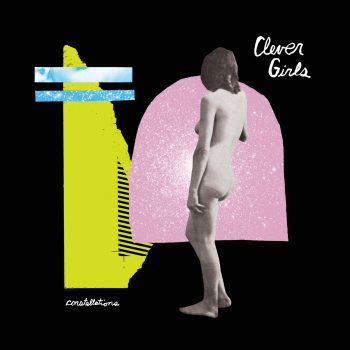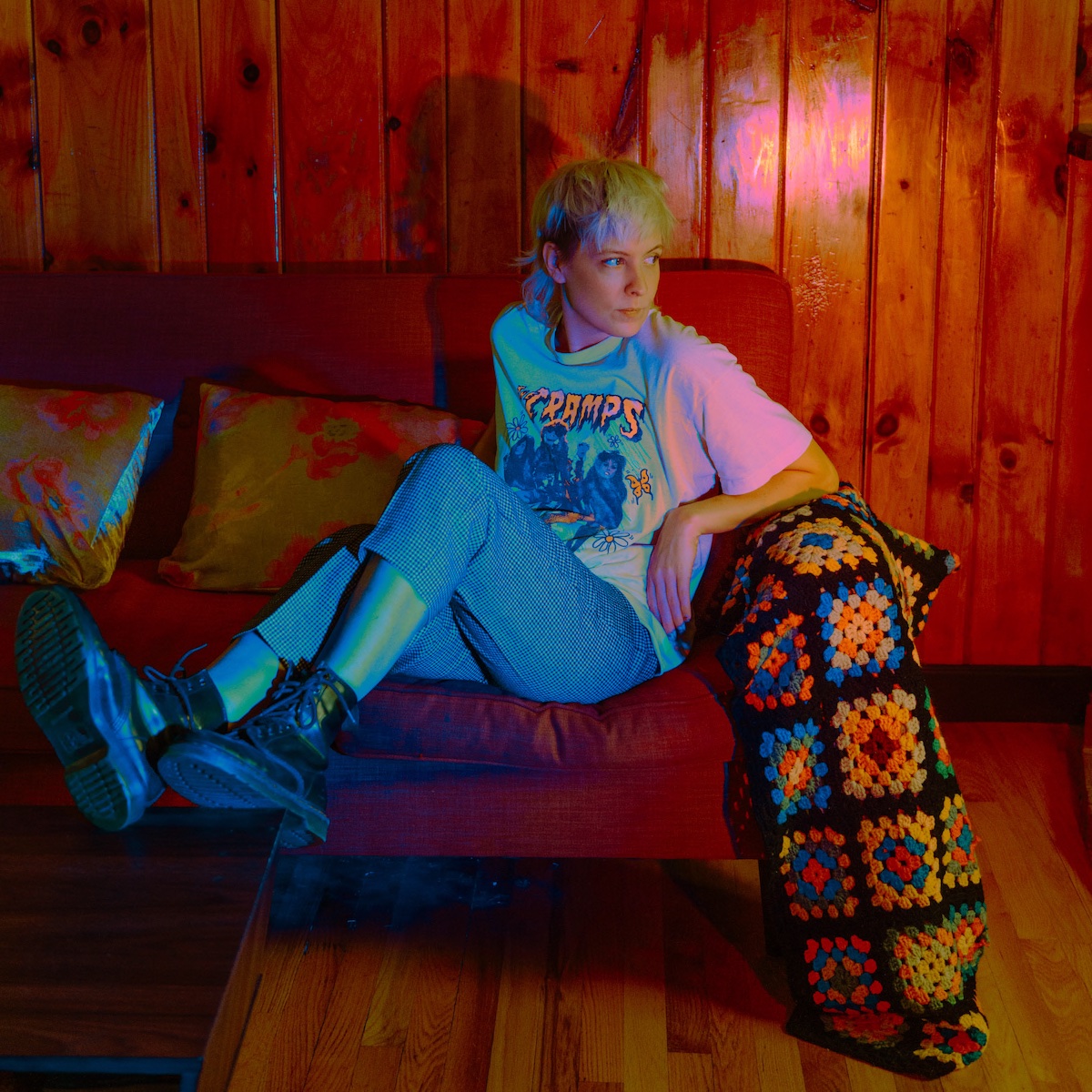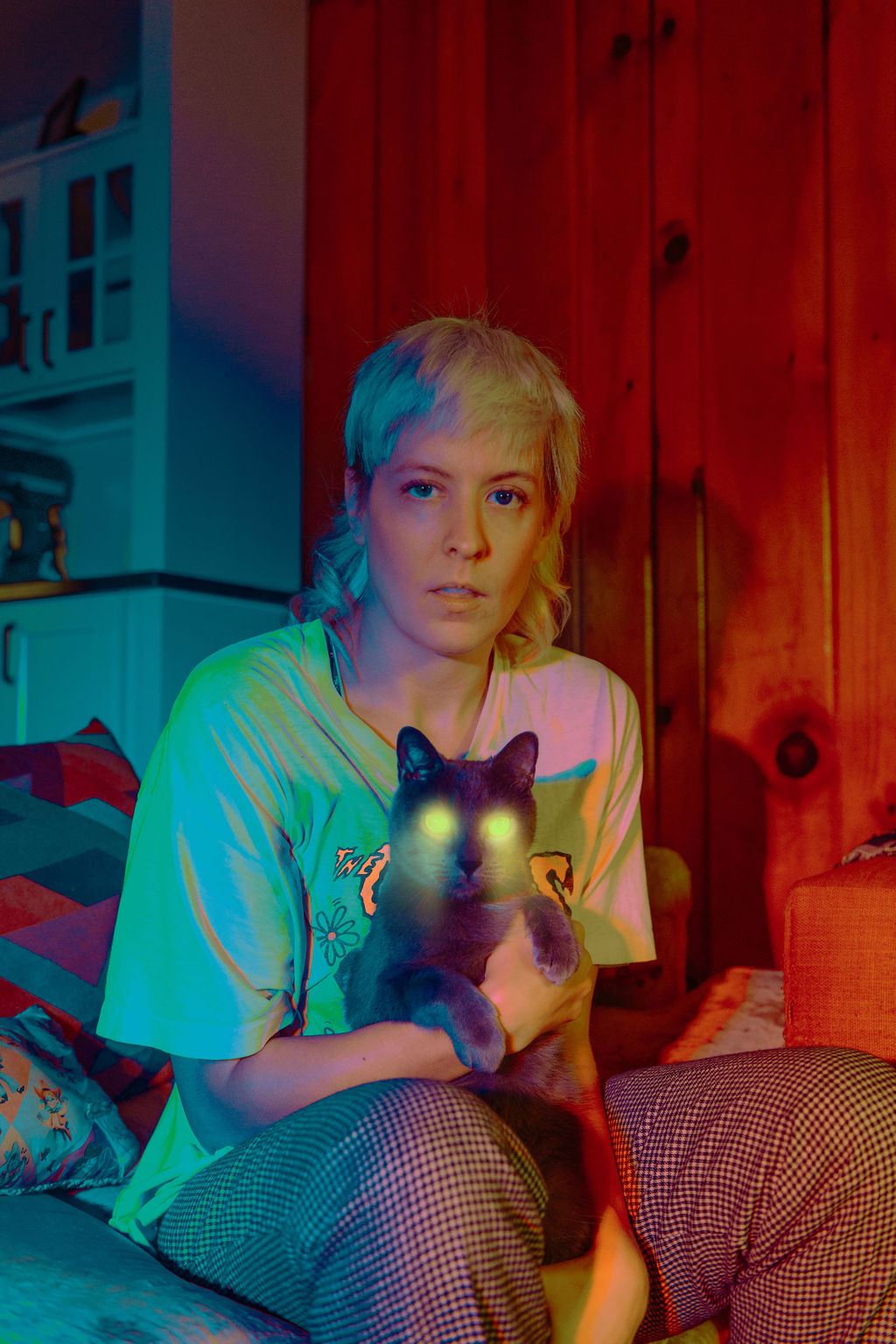Clever Girls’ sophomore album ‘Constellations’ is shaped by lead singer and rhythm guitarist Diane Jean’s personal search for self-care and acceptance. Jean spoke to Atwood Magazine about how this intense production cycle gave them a better record and a new perspective.
Stream: ‘Constellations’ – Clever Girls
Diane Jean is an alternative rocker through and through.
The lead singer and rhythm guitarist is the frontperson for Clever Girls, an indie and garage rock band hailing from modest Burlington, Vermont and proud of it.
As a Portlander, I respect that – partly because I have the small-city complex with Seattle. Mostly because Constellations, Clever Girls’ brand new second effort (out March 26 via Egghunt Records), comprises an indie, grunge and riot grrl melange that relates well to the Pacific Northwest’s post-punk heritage.

Don’t take Clever Girls for some Sleater-Kinney clone, however; Constellations juxtaposes a more refined garage rock sound alongside indie rock melodies and filtered vocals. The album began in the small hours between recording, mastering and touring the debut Luck, but its production took far more than hours to write, record and release.
Jean recounts innumerable rides from their home base in Burlington to the studio in Rhode Island – an endless cycle of tinkering and satisfying the mixes, scrapping pedestrian ones and evolving the protean others, all counting up a two-year production cycle.
A cycle well spent — the refined sophomore record splits along two modes, with an Easter egg third — small electronic dalliances punctuate an album of varying independent and alternative rock. The garage crunch of “Come Clean,” “Lavender,” and “Spark” compliments their indie splendor, providing a counter balance of grunge character to the sweeter moments on record.
Tracks like “Baby Blue,” “Remember Pluto,” and “Saturn” cozy up to contemporary groups like Great Grandpa, Speedy Ortiz, and Charly Bliss to make an alternative yet poppy rock record that is aggressively independent. The band befog that which makes all three adjectives so distinct.
There’s a spry bass from Tobias Sullivan on all three and an easy-going 4/4 from dummer Rob Slater, providing the music some swing while lead guitarist Winfield Holt fills the spaces, taking care not to overshadow Jean’s voice.
In between all the heavy cuts, Clever Girls provide a much needed therapy.

A CONVERSATION WITH CLEVER GIRLS

Atwood Magazine: You wrote some of this record in 2018, which feels like an eon ago, what was the recording and songwriting process like in the intervening three years?
Diane Jean: We worked on our first album, Luck, at the same studio where we recorded [Constellations]. At that time, I was writing songs all of the time, so I was even writing songs as were recording Luck. After we recorded Luck we were on tour constantly so we didn’t get back to the studio until mid-to-late 2019. I was just coming back with all this material I was writing on the road and from previous sessions.
We’re a Burlington-based band and the studio that we worked out of was in Rhode Island so we were doing really intense days-on-end in the studio and just going back-and-forth, back-and-forth, back-and-forth. Every time we get back to Burlington we would think “okay, the record’s done,” and then we would do some sitting and some listening and we’d go “nope, we need to go back.” It was very intensive and whiplash-y, but lots of experimenting and lots of rewriting and remixing.
Would you say it’s more important to record and release at the start of a career or did you feel that there was time to refine and tune-up that record?
Diane Jean: When we were planning on releasing the album I was feeling a lot of self-created deadlines and all this pressure I had been putting on myself to release a record on a certain timeline and work on it [for] a certain timeline and finish it on a certain timeline… Had I done that, I don’t think I would have been able to make the revisions and been able to make the album that I wanted to make. So the extra visits to the studio and the extra time to hone the record worked out for our benefit.
Do Clever Girls have a routine to make the ideas flow easier or is it like a free-for-all, first-come, first-serve affair where you slap-dash ideas down and then refine later?
Diane Jean: For us, it’s definitely the latter. We will be throwing ideas at the wall constantly and then bringing them to the table and putting them under a microscope to get them right. Sometimes we even end up tracking things half-way-through and decide this thing sucks and end up scrapping it entirely or, y’know, we’ll bring half-baked ideas that we’re not not even sure if they’re any good and they ended up being some of my favorite songs on the record. “Fried” is an example of that song; we brought it in really half-baked… no one was crazy about it, and it ended up… a team favorite.

Do Clever Girls have a theme when writing an album or does that come later?
Diane Jean: For us the themes have kind of formulated themselves. Moving forward, [I] would really like to try to reverse that. I really like the idea of coming up with a theme and writing an album it, it’s not something I’ve done. I think the reason that happens for us is my songwriting—as I kind of touched on—happens all at once.
Constellations deals heavily with self-acceptance and self-care. What was the impetus for writing on such themes?
Diane Jean: I noticed towards the end of the writing process that those were the things that were surfacing a lot. What really ended up allowing me to write about those things was the lack thereof that I was having in my life… [I was] just not taking care of myself, not honoring the spaces and relationships and the body I was in and not expressing my gender identity the way I wanted to.
I didn’t even truly know what this album was about until it was done, packaged and ready to go. And… I [realized] “oh my gosh,” all of these songs are really about a journey to self-love which sounds kind of cheesy, but it really is.
Do you feel rock music lends itself easily to these themes of self-love, self-acceptance and self-care or did you have to tease out these feelings?
Diane Jean: My new approach to rock and indie music is that it has to. I’m really glad to be making rock music in a time where that is changing. Because I have friends and peers and musicians I admire, all kind of struggling and writing and creating, if not about the same themes, about similar themes. I found myself asking… do you need to be sad or do you need to devalue yourself in order to make good music? The answer is a hard no. I don’t think that needs to be the case. You can make rock music that lifts yourself up and lifts other people up.

Normally, I (Ben) do not feel comfortable reviewing a record until I have lived with it.
The last few months have been a personal hell that no force outside myself could contend with; a question of whether I am worth my own care or not. So if ever there was a therapy album for a question like that, Constellations is it.
An album composed on a simple self-actuating axis of care, love and identity, Jean skewers Constellations through oblique metaphors parsed and paired together with the same reckless abandon that had inevitably conjured them. Jean proves to be both immediate and mollifying. From the opening verse of “Come Clean,” Jean opines, “It’s no surprise that I’ve made a mess and/ Now you make a mess of me too,” before asking just how they can make amends for it all.
On “Remember Pluto,” they deliver a raw cantabile, singing, “I’ve been the train and I’ve been the tornado, and I’ve been the razor blade and the cotton swab,” in embrace of that stark inner duality that scores a character.
“I buried your tooth hoping, baby, I could grow another version of you, maybe,” Jean remarks on “Spark.” They deliberate awful wishes that should never come true, but are no less caught in the moment. “Burn our house down and start new,” they coo, “I know it’s crossed your mind and it’s crossed mine, too.”
Constellations is not all swarthy sentimentality however, the aforementioned “Saturn” proves Jean’s ability to “skate” on the rings of Saturn and fall into the gravity wells of a lover’s reach. “Sway me like a cradle, my cranial pulse beats,” Jean plays, “Hold me in the palm of your hand/ In the distance my gravity love.”
Jean articulates continually how affairs of self-acceptance and identity complicate relationships. They fragment along sudden caesuras and edgewise words, all hop-jump-skipping subjects sung with little regard to where they once were and where they will go next, suggesting a central question that arrived out of incident, not intent: who is easier to love, yourself or someone else?
In this melee of acceptance, however, Jean tackles an issue as important as it is nuanced, their gender identity. Recounting their journey and their struggle with femininity and selfdom on “Womxn,” Jean mutters an angry disaffection with poetry and body. Words no longer longer provide sanctuary from fingers peeling.
It is all in their head, they admit, figuring out the differences “for [them] to guess and [us] to understand.” The track makes it two verses until, “at long last,” Jean growls.
“Finally, a woman,” they howl.

•• ••

Atwood Magazine: Focusing on the “you” part of the record, “Womxn” features you tackling non-binary self-identification, gender roles, gender expectations... What was the process like, and how did the composing process evolve with the self-discovery process?
Diane Jean: It really was this song written out of being so at odds and so confused by the expectations of femininity and of womanhood and why it didn’t feel like it fit. When I wrote this song, I didn’t know, I couldn’t make sense of it until I realized that wasn’t me. So now I hear all of this anger and all of this frustration and I’m like “oh my god, this person was so lost, this person was so confused, this person was so at odds with everything.”
When we were putting the album together, I was like “I dunno if I want this there,” and I think it was so much internalized frustration, so much of my own internalized transphobia, I’ll be honest, that didn’t want that on the record for anybody to see. And now that I feel that I am very much at peace and understand who I am and where I am in the world, I am happier to have [“Womxn”] on the record for people to see.
Do you get tired of these interrogative questions that mull over artist’s backgrounds, or do you feel like it’s important when explaining the context of the creative work? Is there a death of the author when you write music or is the author still very much alive?
Diane Jean: When we’re talking about songs like “Womxn,” I don’t feel like that author is dead at all, I feel that author has grown up… This album was written after age 25, and the last few years have just been crazy in the amount of growth I’ve done, the amount of understanding I’ve gained and the amount of empathy I’ve gained for myself and everyone around me.
Context is so, so important. It’s not that people won’t understand the album without context, but people who do understand all of this background stuff will appreciate the album a bit more.
The last question about “Womxn,” how did you guys manage to make that guitar tone?
Diane Jean: Oh. My. God. You’re talking about the lead that happens at the very end, right?
Mm-hmm.
Diane Jean: That was like a hundred guitars laid on top of each other. We recorded this acoustic parlor guitar from a karaoke machine and we layered three electric guitars on top of that, and then we reamped the guitar through the same karaoke machine.
I am not exaggerating when I tell you—and on that song particularly—it went on until the sun came up. It was all night in the studio, all fucking night; take after take, after take, after take, after take, after take. And then just getting it to sit right in the mix… how do we make this tone fit this song without it [sounding] like a guitar tone?
The resulting hundredfold flood of layered guitars from Winfield Holt illustrates as the only hiccough. Jean spoke of how theirs and Holt’s respective voice and guitar are indicative of the musical chemistry between them.
Chemistry is an aspect which Jean has recently learned does not come all too easily.
Their vocal-instrumental simpatico has evolved leagues beyond where it began on Luck, all to Clever Girls’ benefit or detriment. From the aforementioned three hits, it is overwhelmingly to their benefit. However, other cuts like “Womxn” or “Spark” are tight to the point of talking over each other.
The only mark against this record — and it is a slight one — is that drowning production can sometimes erase the power in Jean’s lyrical imagery to the song’s detriment. On “Womxn” it works because of the overriding anger in the singer’s voice. Softer songs like “Spark,” however, diffuse the power of that voice by the warmth of the instrumentation. The song melts like butter in the skillet and the listener is left to wait for the next cut to sizzle.
And yet, this only makes for a passing occurrence. More often, Jean sings and the band fills with grace. Clever Girls split the instrumental layers of filtered guitars and synthesizers with clear cut hooks, making a brochette of the heart and rendering a vulnerability rare in the bygone garage and grunge records that form the fundamentals of their music.
Jean also illuminated how the ultimate track, “Fried,” moves past these fundamentals. Taken from the late Nineties/early-Aughts deep house stylings of Dirty Vegas and Deep Dish, the result is a ratty, bottomed-out dance rock cut that would sooner tap feet or bob heads than careen in its underwear on the high that is the penultimate “Saturn.” It marks the band taking an even more progressive step out of themselves.
This all adds up to an album that manages to be endearing without puke-inducing — an alien concept in comparison to their garage rock debut. Clever Girls do not just craft an album with variety, they open up their sound to possibilities. Less a slump, more of a launch.
Constellations is an early favorite, a precocious indie rock record with enough crunching predilections to engage interest and plenty of streetwise poetry to bruise and balm the breast. It is in an early personal company of albums of the year based on gumption alone. Even if the instrumentation oversteps the lyricism at times, the sheer character and resilience in the production of this record means more, feels more and does more.
For Clever Girls, it is a graceful landing for what was a turbulent two years among Constellations.

•• ••

Atwood Magazine: “Saturn” being the most danceable garage rock song, what were the key elements when writing that song?
Diane Jean: That one I decided I really just wanted to write a dance tune, to be honest. It was a decision… The working title for this song was “Dance, Dance in Your Underwear.” [And while] working with Chaimes Parker he said “we need to do something so fun before you record the vocals on this, we need to go Go-Karting!”And I was like, “ok, that sounds fun” just like a fun little aside.
But before we recorded [“Saturn”], I broke two teeth in my mouth and so I was in the studio, trying to record this really fun song that I wanted to be fun, that I decided to be fun… and I was in the worst pain of my life. Like, how did this happen? I don’t fucking know. (laughs)
Winfield Holt and you play together in a very compelling way on “Stonewall” both on the guitars. I believe that’s you and Holt on the guitars?
Diane Jean: Yeah, it is. Actually, I am on keys, it might sound like a guitar but those are keys. The guitar leads, obviously, and then there’s a chordal key synth happening. That song is really, really special. I am really fond of that song.
How do you guys prearrange that interplay or does it come out naturally in jam sessions?
Diane Jean: Winfield and I have a really interesting dynamic because we never had to work that hard to make our parts fit together… our guitars are never fighting each other and that’s one of my favorite things about Clever Girls.
It’s very indicative of the writing relationship we have, and [“Stonewall”] came together very naturally… Of the record as a whole I think it’s the most straightforward and it’s really beautiful. More recently I’ve collaborated with other people and I’ve realized that chemistry doesn’t just happen as naturally so it’s not something I take for granted.
— —
:: stream/purchase Constellations here ::
— — — —

Connect to Clever Girls on
Facebook, Twitter, Instagram
Discover new music on Atwood Magazine
? © Kay Dargin
:: Stream Clever Girls ::








